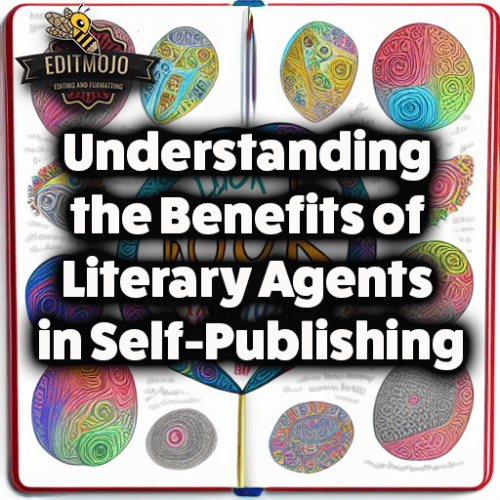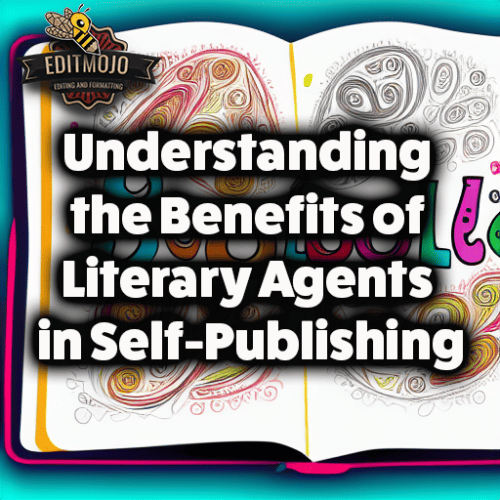Understanding the benefits of literary agents in self-publishing
Understanding the benefits of literary agents in self-publishing. Welcome, authors, to the world where creativity meets business, a world known as self-publishing. It’s the exciting journey of taking your manuscript and delivering it straight into the hands of readers. Many may perceive this path as solo, yet there’s one companion you might not have considered – a literary agent.
Self-publishing has grown in popularity over the years due to its promise of creative control and potential for higher royalties. On the flip side, the process can be daunting. For some, the missing link in this pursuit might be a literary agent. Their role in traditional publishing is well known, but their role in self-publishing is often underestimated.
Key Takeaways
| Key Points | Explanation |
|---|---|
| What is Self-Publishing? | Self-publishing is an independent route to publication, bypassing traditional publishing houses. The author is responsible for editing, designing the cover, formatting, pricing, publishing, and marketing. |
| The Role of a Literary Agent | In traditional publishing, literary agents represent authors, negotiate contracts, pitch manuscripts to publishers, and provide career guidance. Their role in self-publishing is emerging and evolving. |
| Benefits of a Literary Agent in Self-Publishing | Literary agents can review and improve manuscripts, provide access to professional resources and contacts, and offer negotiation and legal expertise. |
| When You Might Not Need a Literary Agent | If you are comfortable handling all aspects of self-publishing or want to maintain complete control over the process, you may not need an agent. Also, consider the financial implications, as agents charge a percentage of an author’s earnings. |
| Choosing the Right Literary Agent | Research to find agents experienced in your genre and with self-published authors. Look at their track record and ensure you have a clear, beneficial agreement. |
II. Understanding Self-publishing
A. What Is Self-publishing?
Simply put, self-publishing is the process by which an author independently publishes their work, bypassing traditional publishing houses. It’s like baking your own cake and deciding on the flavor, icing, and decorations without needing a professional baker’s approval.
Unlike traditional publishing, where publishers take the responsibility of editing, cover designing, marketing, and more, self-publishing requires the author to handle or outsource these aspects. It’s a path that offers creative control but can also be time-consuming and challenging.

B. The Self-publishing Process
The self-publishing process involves various steps, including writing, editing, designing the book cover, formatting, deciding on a price, choosing a platform for publication, marketing, and distribution. Authors often compare it to being a sailor navigating the stormy seas. And like any journey, self-publishing has its peaks and troughs. According to a recent study, more authors are choosing to brave these waters due to the potential rewards.
III. What is a Literary Agent?
A. The Role of a Literary Agent in Traditional Publishing
Imagine you’re an athlete preparing for a race. You can train by yourself, but having a coach by your side could help you refine your technique, provide strategies, and offer support. In traditional publishing, a literary agent is akin to that coach. They work on behalf of authors, negotiate contracts, pitch manuscripts to publishers, and provide career guidance.
B. The Perceived Lack of Necessity for Agents in Self-Publishing
Some believe that literary agents are as irrelevant to self-publishing as a lighthouse to a train. After all, if you’re self-publishing, why would you need an agent? The route is direct, and you’re bypassing the traditional publishing houses that literary agents usually negotiate with. But this perspective might be missing the bigger picture.
C. Emergence of Literary Agents in Self-publishing
Today, the role of literary agents is evolving. Just as more authors are exploring self-publishing, literary agents are also venturing into this growing field, adding a fresh twist to their traditional role. A number of literary agents are now offering their services to self-published authors.
IV. Why a Literary Agent Can Be Beneficial in Self-publishing
A. How Literary Agents Can Assist Self-published Authors
An experienced literary agent can offer several benefits to self-published authors. They can provide a manuscript review and suggest improvements, thus ensuring your book is in its best possible shape before hitting the market. They can also connect you to a network of professional contacts and resources, including editors, cover designers, and marketing professionals. Furthermore, agents can provide negotiation and legal expertise, protecting your interests in any contractual situation.

B. Advantages of Having an Agent in Self-publishing
It’s like having a backstage pass to the publishing world – agents can unlock doors that might otherwise remain closed. For instance, they can help you gain access to publishing platforms that don’t normally accept self-published works. Also, in case of a hybrid publishing approach, or if you wish to sell foreign rights or secure a movie deal, a literary agent can be invaluable.
C. Case Studies
Take the case of Hugh Howey, author of the self-published “Wool” series. When Howey’s book started to gain traction, he sought out an agent who helped him negotiate a print-only deal with Simon & Schuster, allowing him to retain his digital rights – a rare accomplishment in the publishing industry.
V. When You Might Not Need a Literary Agent in Self-publishing
A. Scenarios Where a Literary Agent May Not Be Necessary
While the benefits are numerous, not every self-publishing journey needs a literary agent. If you’re comfortable handling the publishing process, from editing to marketing, or if you prefer to maintain total control over every aspect of publishing, you might decide to go it alone.
B. Financial Implications (Understanding the benefits of literary agents in self-publishing)
Engaging an agent does come with costs. Typically, literary agents charge a percentage (usually 10-15%) of an author’s earnings. Therefore, it’s important to weigh the potential benefits against the financial implications.
VI. How to Choose the Right Literary Agent for Self-publishing
A. Finding and Choosing a Literary Agent
Choosing the right agent is crucial. Research and network to find agents who have experience in your genre and have worked with self-published authors. Look into their track record and seek testimonials or reviews from other authors.
B. Importance of an Agent-Author Agreement
Always ensure you have a clear and beneficial agreement. Make sure you understand all the terms and conditions before signing. It’s essential to have an attorney review the contract if possible.

VII. Future of Self-publishing and the Role of Literary Agents
The world of self-publishing continues to evolve, and so does the role of literary agents. As the industry grows and changes, there may be even more opportunities for collaboration between self-published authors and agents.
VIII. Conclusion (Understanding the benefits of literary agents in self-publishing)
Self-publishing is an exciting and challenging journey. While it offers many benefits, the process can be complex and time-consuming. A literary agent can provide valuable assistance, from refining your manuscript to navigating contractual matters. However, the decision to hire an agent should be based on your specific needs and goals as an author. The future of self-publishing and the role of literary agents in it is full of possibilities. Here’s to continuing the conversation and exploring them together.
So, fellow authors, may your pens stay sharp, your ideas fresh, and may your publishing journey, whether solo or accompanied, be fulfilling!
Top Five Questions and Answers (Understanding the benefits of literary agents in self-publishing)
| Questions | Answers |
|---|---|
| What are the benefits of self-publishing? | Self-publishing offers the author complete creative control, potentially higher royalties, and the ability to reach the market quicker than through traditional publishing. |
| How can literary agents assist self-published authors? | Agents can review and improve manuscripts, provide access to professional resources and contacts, help with publishing on exclusive platforms, and offer negotiation and legal expertise. |
| Do all self-published authors need a literary agent? | No, not all self-published authors need a literary agent. It depends on the author’s comfort level with the publishing process and their specific needs and goals. |
| How do I choose the right literary agent for self-publishing? | Research to find agents experienced in your genre and with self-published authors. Look at their track record, seek testimonials, and ensure you have a clear, beneficial agreement. |
| What is the future of self-publishing and the role of literary agents? | The self-publishing industry continues to grow and evolve, offering more opportunities for authors. The role of literary agents in self-publishing is expected to evolve, with potential for greater collaboration between agents and self-published authors. |
